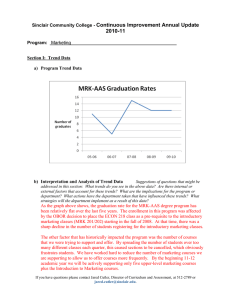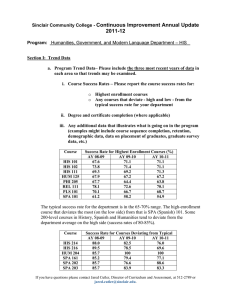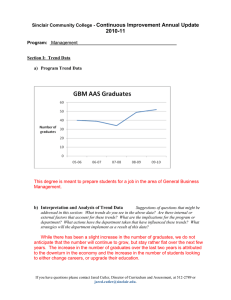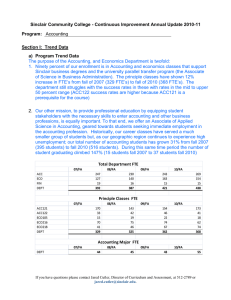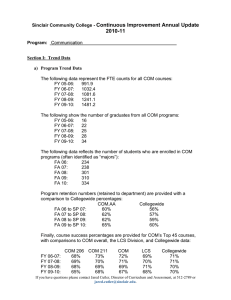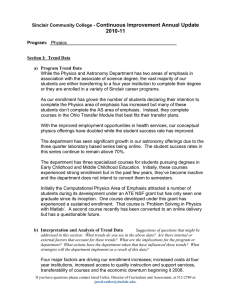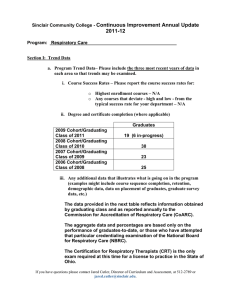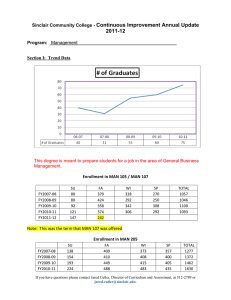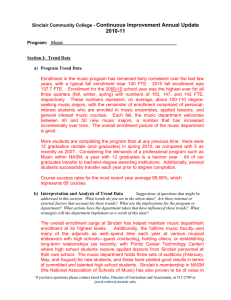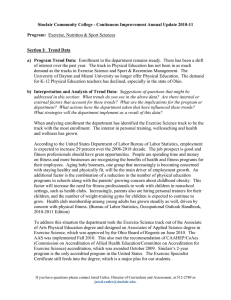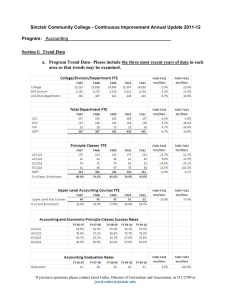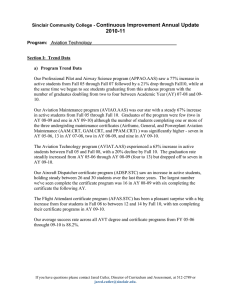Continuous Improvement Annual Update 2010-11
advertisement
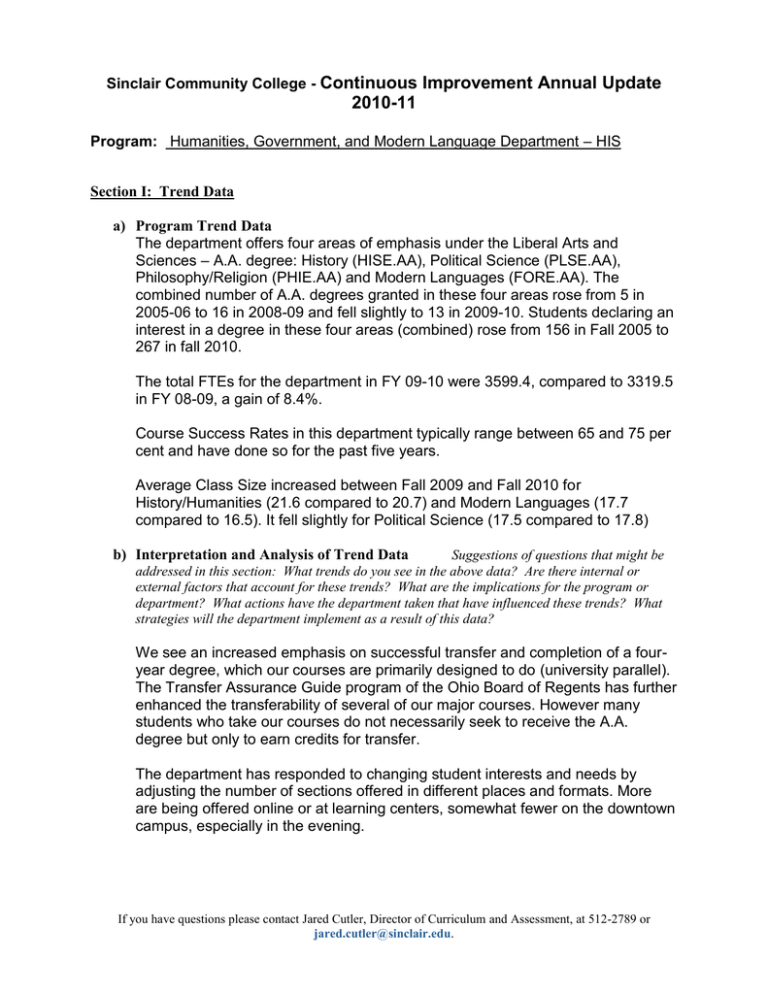
Sinclair Community College - Continuous Improvement Annual Update 2010-11 Program: Humanities, Government, and Modern Language Department – HIS Section I: Trend Data a) Program Trend Data The department offers four areas of emphasis under the Liberal Arts and Sciences – A.A. degree: History (HISE.AA), Political Science (PLSE.AA), Philosophy/Religion (PHIE.AA) and Modern Languages (FORE.AA). The combined number of A.A. degrees granted in these four areas rose from 5 in 2005-06 to 16 in 2008-09 and fell slightly to 13 in 2009-10. Students declaring an interest in a degree in these four areas (combined) rose from 156 in Fall 2005 to 267 in fall 2010. The total FTEs for the department in FY 09-10 were 3599.4, compared to 3319.5 in FY 08-09, a gain of 8.4%. Course Success Rates in this department typically range between 65 and 75 per cent and have done so for the past five years. Average Class Size increased between Fall 2009 and Fall 2010 for History/Humanities (21.6 compared to 20.7) and Modern Languages (17.7 compared to 16.5). It fell slightly for Political Science (17.5 compared to 17.8) b) Interpretation and Analysis of Trend Data Suggestions of questions that might be addressed in this section: What trends do you see in the above data? Are there internal or external factors that account for these trends? What are the implications for the program or department? What actions have the department taken that have influenced these trends? What strategies will the department implement as a result of this data? We see an increased emphasis on successful transfer and completion of a fouryear degree, which our courses are primarily designed to do (university parallel). The Transfer Assurance Guide program of the Ohio Board of Regents has further enhanced the transferability of several of our major courses. However many students who take our courses do not necessarily seek to receive the A.A. degree but only to earn credits for transfer. The department has responded to changing student interests and needs by adjusting the number of sections offered in different places and formats. More are being offered online or at learning centers, somewhat fewer on the downtown campus, especially in the evening. If you have questions please contact Jared Cutler, Director of Curriculum and Assessment, at 512-2789 or jared.cutler@sinclair.edu. Section II: Progress Since the Most Recent Review a) What was the fiscal year of the most recent Program Review for this program? 06-07 b) Briefly summarize the goals that were listed in Section IV part E of the most recent Program Review Self-Study (this section of the Self-Study asks “What are the department’s/program’s goals and rationale for expanding and improving student learning, including new courses, programs, delivery formats and locations”)? The goals were to: 1) maintain high quality of course delivery in new, diverse formats; 2) enhance our assessment efforts; 3) enhance development of adjunct instructors; 4) seek additional reassigned time for lead faculty in our various disciplines of study, to allow for better management of our diverse offerings. c) Have these goals changed since your last Program Review Self-Study? If so, please describe the changes. No d) What progress has been made toward meeting any of the goals listed above in the past year? The semester conversion process mandated a review of almost all of our courses in terms of defining more clearly courses objectives and learning outcomes. Course coordinators have been given responsibility for maintaining uniform quality standards for our distance learning sections. The department chair has been able to re-allocate a small number of his reassigned hours to the lead faculty who serve as discipline coordinators, although the amount is inadequate for the needs we have. Faculty development for our adjuncts has benefited from the college-wide adjunct certification training course, although the department continues its own work in this area as well. Some assessment work has been done in a few courses, but more needs to occur. New, more specific, program outcomes have been adopted for each of our areas of emphasis and this will help improve assessment efforts in the future. e) What Recommendations for Action were made by the review team to the most recent Program Review? What progress has been made towards meeting these recommendations in the past year? The review team recommended more assessment efforts, course coordinators for high-enrollment courses, better support for adjunct faculty, a standardized form for student surveys of instruction, and increased articulations with area universities. Some of these are being addressed by college-wide or state-wide initiatives, such as the Transfer Assurance Guides, Adjunct Faculty Certification Course, and the Pilot Program for uniform student surveys in all course sections. The department adopted the course coordinator model for our online sections. The lead faculty in our disciplines work closely with adjuncts to promote common practices and consistent standards in the traditional classroom sections. If you have questions please contact Jared Cutler, Director of Curriculum and Assessment, at 512-2789 or jared.cutler@sinclair.edu. Section III: Assessment of Outcomes The Program Outcomes for this program are listed below. At least one-third of your program outcomes must be assessed as part of this Annual Update, and across the next three years all of these program outcomes must be assessed at least once. Humanities, Government, and Modern Language Program Outcomes In which courses are these program outcomes addressed? 1) Demonstrate the ability to think logically and problem solve using analysis, synthesis and evaluation. HUM 125 PHI 205 2) Demonstrate and articulate an understanding of the increasing interdependence of world cultures and their consequences. HIS 113 PLS 200 Pre- and post- Assessment Methods Used testing 3) Demonstrate responsibility and accountability in accomplishing goals. 4) Demonstrate effective communication in a variety of ways with varied audiences through: writing skills, oral communication skills, listening skills, reading skills, computer literacy, and information literacy. Which of these program outcomes were assessed during the last fiscal year? SPA 103 a) For the assessment methods listed in the table above, what were the results? What changes are planned as a result of the data? How will you determine whether those changes had an impact? Results indicated that students typically enter these courses with limited knowledge of world cultures but leave with enhanced awareness of the reality of global interdependence. More work needs to be done to improve the student’s ability to use this knowledge to construct arguments and explanations relating to the consequences of this interdependence in contemporary society. b) What other changes have been made in past years as a result of assessment of program outcomes? What evidence is there that these changes have had an impact? Changes have been made in the content and assignments in French and Spanish to enhance writing and oral comprehension skills. Progress in these areas has been noted on nationally-normed tests given to students finishing the first-year sequences. If you have questions please contact Jared Cutler, Director of Curriculum and Assessment, at 512-2789 or jared.cutler@sinclair.edu. c) Describe general education changes/improvements in your program/department during this past academic year (09-10). The department continued to work with administrators and staff at the Learning Centers and Courseview Campus to increase course offerings at the best possible times. Additional faculty were recruited to teach at Courseview. Semester Conversion continued, and all of our new semester courses were submitted to the provost’s office by the deadline of 31 January 2011. The entire first-year Spanish sequence (SPA 101-102-103) is now available in distance learning format (online). Two new courses, Conversational Spanish for Health Professionals and Native American History, were approved and added to the curriculum. Section IV: Improvement Efforts for the Fiscal Year a) FY 09-10: What other improvement efforts did the department make in FY 09-10? How successful were these efforts? What further efforts need to be made? If your department didn’t make improvement efforts during the fiscal year, discuss the strengths and weaknesses of the department over the last year and how the department plans to address them in the coming year. The department was able to hire one additional tenure-track faculty in history in FY 09-10. However, the loss of two ACF positions in FY 08-09, which have not been replaced, means that the full-to-part-time ratio remains a matter of concern. This is especially true in modern languages and philosophy/religion. In each of these areas about 70% of instruction is currently provided by adjunct faculty. While overall enrollment did not grow measurably last year (although it varied across disciplines), technology and growth of new campus sites has forced the department to provide for a greater variety of course formats and course locations. b) FY 10-11: What improvement efforts does the department have planned for FY 10-11? How will you know whether you have been successful? The department will experiment with a different format for the annual faculty development workshop for adjuncts, having the adjuncts themselves play a more active role in presentations. Greater use of area-specific program outcomes will hopefully lead to a better on-going assessment program. Success in these efforts will be measured on student surveys of instruction and results of pre- and posttesting in selected courses Questions regarding completion of the Annual Update? Please contact the Director of Curriculum and Assessment at 512-2789 to schedule a time to review the template and ask any questions. If you have questions please contact Jared Cutler, Director of Curriculum and Assessment, at 512-2789 or jared.cutler@sinclair.edu.
